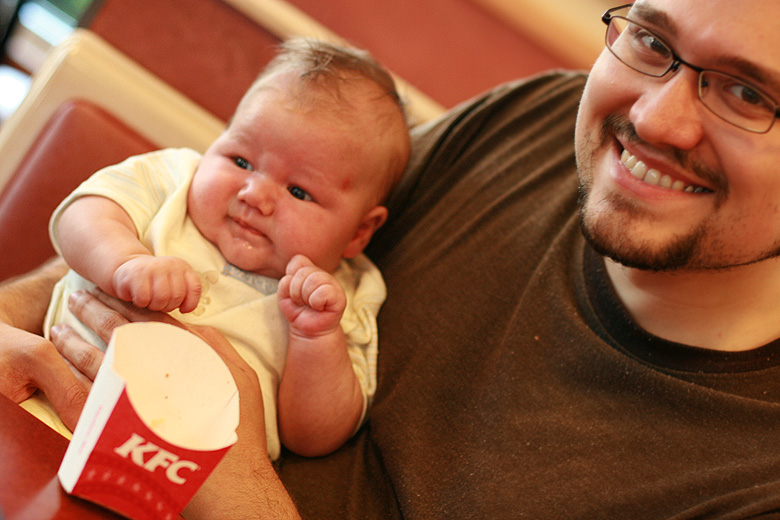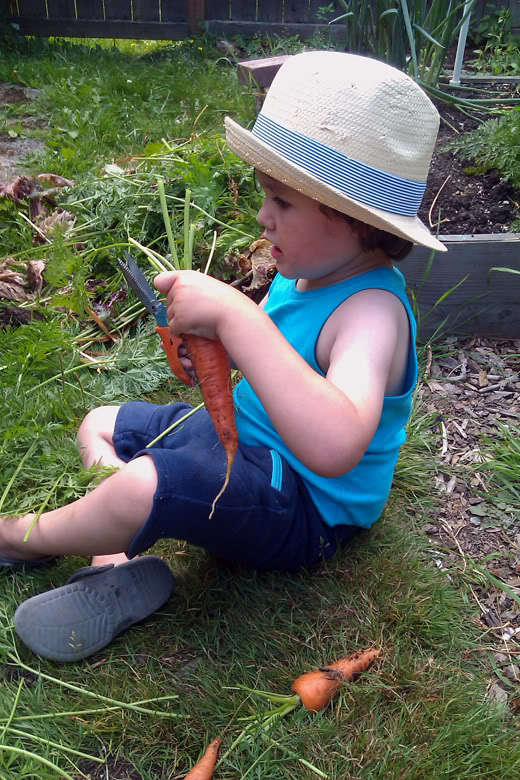Today I'm talking a little about the challenges of changing not just your eating habits — but your whole family's. I'm delving into my own personal struggles with just this topic and offering my fondest goals and best advice on transitioning reluctant kids and partners. Feel free to share your tips in the comments!
 |
| No newborns were given fast food in the making of this picture. We figured it was safe to continue our questionable eating habits before our kids were old enough to notice … but then they noticed. Whoops! |
Before I had kids, I figured it would be straightforward to get them to eat the way I wanted. I just wouldn't introduce bad habits, I reasoned. I'd present only healthful options, and they wouldn't know anything else existed. I'd offer flavorful and spicy dishes, and they would eat them and not be picky, because they wouldn't know any differently.
And then I had Mikko. Ah, the age-old story of pre-parenting certainties smacked down by actual-parenting realities.
He was slow to take to solid foods anyway, which I figured was fine. We were doing baby-led solids, and Mikko was as adventurous about tasting food as I could have hoped — pickles, lemons, sushi, asparagus, salsa — anything would go into his mouth. Not much stayed in there — he was about 18 months before he apparently learned to swallow — but despite the funny faces he made during his taste tests, I was reasonably smug that I'd managed to avoid raising a picky eater.
Until … that's exactly what he became. Slowly, he started dropping foods he'd tolerate in his mouth or on his plate. By three, he was down to one vegetable — broccoli — and the rest of his diet was what I termed White Foods: rice, chicken breast, pasta (no sauce!), French fries (the food of kings). It was a little depressing and a lot humbling. At one point, he abandoned even broccoli, and I just had to keep in mind his high energy, his more than adequate size and growth rates, and his apparent good health, and shake my head at the way nature seemed to have designed preschoolers to be finicky.
 |
| Cleaning up after a typical meal of pancakes with powdered sugar. Because maple syrup does not fit the All White Foods Diet. |
I also had plenty of self-blame to spare. Sam and I had been fast food fiends until one day young Mikko pointed at an Arby's logo and said, "Food!" It was the horror of hearing his squeaky voice assuming that questionable roast beef was the whole sum of nutrition that had Sam and me deciding right then and there, We would no longer eat fast food. We even came up with a rule: If it has a drive-through, we can't go. We made a couple exceptions but have stuck with the basic tenet since then, and no one's been as surprised as we have. Despite being one of our longest held habits, it was surprisingly easy to give up … for us. Mikko still asks us weekly to go to one of the places. Weekly! At least! And he was around two when he last went (I thought) and is now five and a half. Parents' bad nutritional choices linger, hey? Or maybe our kid is just really, really stubborn. (He is!)
Now, there is one reason Mikko still begs for Arby's — when I took a trip to Portland this past summer with just Alrik, one way Sam consoled Mikko for staying behind was with … a trip to Arby's. Ah! So you break the rules once, and now your kid thinks it's a free-for-all?
 |
| How could I not share my love of muddy buddies with my little buddy? |
It's so complicated, this dance of parental rules and responsibility vs. the kid's own choices, desires, and will. And no matter what you choose as a parent, there's probably someone with an anecdote telling you you'll screw up your kids for life. Let your kids eat all the Mickie D's and Willy Wonka they want? They'll become hedonistic monsters. Police their food and allow only vegan wheatgrass smoothies? They'll rebel and become hedonistic monsters. Pretty much everyone suspects kids will become hedonistic monsters, I guess.
Sam has a lot of pent-up anxiety about just that subject — the effect early childrearing has on later food choices and eating habits — and I don't know exactly what to tell him, just that I don't think it's usually as dire as he worries. If Sam has a fault, it's that he loves us and wants us to be happy, to the exclusion of other considerations. Oh, I know — I'd take a fault like that any day! He doesn't like to refuse requests, whether it's for the juice the dentist said was a no-go with Mikko's tooth problems, or the seventh popsicle Mikko demands when he's feeling sick. If I venture with advice to be the parent and just say no, Sam muses back that he doesn't want to give our kids a complex around food, that he doesn't want them zooming away from our restrictions to unfettered gorging. There's always a story of a kid who was never allowed sweets who spent her twenties in a sugar coma, or — as with Sam himself — who had his TV and movie viewing strictly monitored and curtailed and grew up to become a film critic and avid screen starer. But, see, I'm with him on that, and my parents didn't curb my television viewing much at all growing up. There wasn't as much on, because we lived in the dark ages, but I don't remember any particular rules about it. And my friend who didn't watch a lot of TV growing up and who had parents who were very particular about when and what to eat grew up to be an adult who doesn't much like watching TV and thinks half an apple makes a swell dessert … but only if she's not already full from eating all her vegetables at dinner. So there's no streamlined, one-size-fits-all, do-this-and-your-kids-will-become-that sort of answer to controlling or not controlling your kids' eating habits.
In my own life, it's this multi-directional clash: my ideals for what my family should be eating, the restrictions of our budget (I wish we could afford half a steer of grass-fed beef and had someplace to put it…), the beautiful reality that Sam cooks for us but therefore any changes have to be approved by him, Sam's reluctance to hurt our kids' feelings by gainsaying various treats, my reluctance to listen to whining about various treats without giving in, my own bad habits that get passed on to my kids (ah, diet soda! how will I ever shake thee?), and a million compromises that come about at the crossroads of all these competing interests.
Based on a lot of research and soul searching and experimentation within my own family, and with my own picky eaters, here's what I've come down to believe about changing your family's eating habits. You have to figure out what feels authentic for your family and your situation, but here are my own goals in writing.
- It's all right as a parent to set limits.
For some people, this will seem like a no-brainer. For the tender-hearted, this can be reassurance: Your child will not wilt under a reasonable set of standards. That's what you're the adult for, to offer your own hard-won wisdom and guidance. For the radical among us, the idea of limit setting might seem anathema, and I entertained that line of thought for some time but have rejected this extreme. If my kid asks for Cheetos when that's not something we want to have in our home, I can decide what the limits are in a way that's still respectful of my child.
- There are many ways to respond to food requests.
The Cheetos example, for instance. Here are some possible respectful answers, depending on your child's age and the situation:
- Determining the core of the request: "Everything in the store looks good to you right now, huh? Let's get home quickly to have a good dinner; I think we're both hungry."
- Offering alternatives: "They do look intriguing, but that's not a food we buy. If you want a treat, I feel comfortable buying [this] or [this] instead."
- Explaining your reasons: "We don't buy [X food] because it has ingredients that don't make us feel good or keep our bodies healthy." Or "We don't buy food from [X brand] because we don't like the way they do business" (with further explanation).
- Deflecting to the future: "Yes, when you're a grownup, you can choose which foods to buy and eat, and you can decide what makes your body feel best."
- Calling on authority: "The doctor [or dentist] reminded us that this food is hard on your body [or teeth]."
- Acknowledging deviations from the norm without letting them derail your convictions: "When you're at Nana's, you can eat [X food] if she offers it, but we don't like to keep it at home because it's not something we eat." Or "We had cake for your birthday party because it was a special occasion, but we don't usually buy cake."
- Compromise: "You can buy the single-serving as a treat, but this is not a regular occurrence." (And then stick to that.) Or "You can spend your allowance on whatever you want; you have $X right now, so you can choose what to do with it."
- Set a numerical limit: "We each get one treat per day [week], and you can choose whether it's this one now or [X planned treat] later."
Very young kids might need some hardcore distraction from the temptation. I recommend startling, comical noises and funny faces while spiriting away the forbidden food. If you're the one caught with a screaming tot in the grocery store, just know: We've all been there.
- Don't make it judgmental.
I've found it works best if I can talk about food in a matter-of-fact voice, without a lot of value-laden language, saying basically, "This is how we do things. This is the food we eat in our home. This is how we eat it." It's not a battle line, not a condemnation of the way other people do things, just a reiteration (as often as necessary) that this is how you've chosen to feed your family. For instance, the line above isn't "I hate that when you're at Nana's, she's always offering you junk! We don't eat that nasty stuff." You don't know other people's reasons for eating the way they do, and it's none of your business. And who knows — maybe the nutritional certainties you hold today will be busted tomorrow, so it's always good to keep a little humility at hand even when preaching to your own kids. Speaking of which…
- Be willing to admit when you've changed your mind.
Mikko's a clever dude. He asks us why we used to eat fast food but don't now, or why we've made other dietary changes. When we started buying food with six ingredients or fewer, he wanted to know why we'd decided on that. Even though we're the grownups, we're allowed to say that we've learned something as we've gone along. I want to be transparent with my kids that I'm still growing up, too!
- Smooth the transition.
Let's say you've had a lifestyle about-face and want to bring your family along but they're not in a cold-turkey mood. Assuming there's no urgent medical contraindication, there's no harm in making a gradual change. This can especially be helpful when the reluctant ones (kids or partner) are older — when habits are well formed and change would be easily detected.
First of all, there's no harm trying to explain your reasoning for the changes. If you've been reading something, or watching a documentary, or following along on this challenge, say, you could bring what you've learned to the rest of your family and hope they catch your excitement. You can brainstorm together ways favorite foods might be adapted. Maybe you could craft homemade versions of store-bought cravings, or make up a list of already loved foods that fit the new criteria and affix it to the fridge as a reminder of the possibilities. You can gradually lessen the amount of offending foods you buy. You might leave fewer options around (just one treat at a time instead of an assortment) and wait to restock until you're specifically asked.
For us, we used to have two well-stocked junk drawers and now are down a single echoing one. We stocked up on a lot of snacks and meals that work for everyone — string cheese, fresh and dried fruit, nuts, various meats — so we have options to offer when the kids start asking for the things we've stopped buying. But for now, we do have (because Sam insists; I'm torn about this) at least one type of bread or cracker item on hand at all times as well as usually one or more treats, and he still makes the boys pancakes, crepes, and peanut butter cookies when they ask for them. They're also allowed to choose whatever they want when we're at a restaurant or someone else's house. We've been talking over our new eating habits with Mikko, and I'm sourcing some children's books that will help me illustrate the changes we've made. I'm hopeful that we'll all continue to move more toward our ideal as a family.
If all else fails, don't let the anti-recruits bring you down. Just keep on with your bad self and let them catch up to you or not as they wish. If you're the cook, it might mean … helping them learn how to cook for themselves!
- Don't sweat it too much.
This is the one I have to remind myself and Sam of over and over, because Mikko is one persistent little guy when it comes to begging, and Alrik seems to be following right in his older brother's footsteps. Christmastime taught my one-year-old the word for "candy" (my parents gifted both boys with untold refills of Pez dispensers), and while pretty much anything's cute coming out of his mouth, I recoil from hearing him pine for flavored-sugar-rectangles at his age. Sometimes I wonder if our kids are already too badly broken and I just have to give up, and Sam worries that we're scarring them for life by trying to mold them into healthy eaters, and I think we both need to chill. They'll be fine. Probably. And if not, it's not all our fault. Probably.
Ultimately, I don't want to lend food (and diet and nutrition and health and weight and cultural standards) too much power. I don't like to think that the Most Important Thing about us as humans is what food we put in our mouths. We're much more than that, and I don't want to lose sight of what's special and endearing about even the dietary screw-ups among us, myself included. If my kids grow up unhealthy or unhappy, I can always change the earmark of their college savings to therapy funds.
- Give it time, and a lot of patience.
Remember when I said Mikko went down to zero vegetables he would eat? That was at the nadir of his pickiness, and he's gradually recovering — he's up to two consistent veggies and counting, and he's much more willing to taste unfamiliar foods and give a thumbs up or thumbs down instead of just grimacing and pulling away.
Any change takes time and has to take child development into account. Particularly if you're battling ingrained habits, they're not going to become forgotten overnight. With headstrong kids like ours, you have to say over and over and over and then a few more thousand times that you don't eat or buy that food anymore. So take a deep breath now and keep on taking them, because it's not ending anytime soon.
Consider too all the cues our kids — and all of us — receive, encouraging them to eat the standard way: the blaring commercials extolling the health benefits of a morning bowl of neon-brighttable sugarwhole-grain cereal, the prominent displays at grocery stores of the most tempting items, the messages non-agreeing family members send with the treats and goodies they smuggle to your poor deprived kids, the way other families eat (every family's way of eating is different, and I guarantee you all my friends thought my parents were the coolest with the amount of Doritos and Oreos and Kool-Aid we always had freely available in our cupboards), the foods featured at restaurants on the kids' menus, and on and on. There's no escaping the rest of the culture telling your kids, "Eat this way! It's fun and tastes better!" As an adult, you might be able to resist it (probably not entirely and maybe not at all, and I really see no shame in that), but there's no way your kids are going to avoid it completely, so you'd better be prepared to stand in as their guide and consistent counselor of "Yes, some people eat such and such, but we eat this way."
I think that's what it's boiled down to when I think of my role as guardian of my children's formative feeding years. I'm trying to guide them — to facilitate good eating habits by modeling my own, by offering an assortment of healthful foods, by buying the best quality we can budget but not despairing over what we can't afford, by not attaching moral value to how much or what my kids eat, by not interfering at all in how much they eat overall, by using positive messages and language when I refer to their bodies or ours, to talk with them about nutrients and digestion and what makes our bodies feel good. Sam and I still have a lot to iron out in terms of implementation, but I'm confident that that's the direction I want to go.
 |
| He'll touch carrots now even if he's still not sure about eating them. Baby steps, right? |
Have you had to change your family's eating habits? How easy or hard was it to get your kids or partner on board? Do you have any tips for transitioning hesitant family members?
Join in and follow along on the Six Ingredient Challenge as we continue to blog about our journeys toward whole foods in this six weeks!









 I'm Lauren Wayne, writer and natural parent. I embrace attached parenting with an emphasis toward green living.
I'm Lauren Wayne, writer and natural parent. I embrace attached parenting with an emphasis toward green living. 


4 comments:
Love this post Lauren! Thank you for sharing your journey in this potential minefield - you have a great attitude and it's very encouraging to someone who's going through similar circumstances (and a good reminder that sometimes it's a good idea to slow down a little).
Very proud of you (and me!) and anyone who is trying to make these healthy and oh so difficult at times changes - best of wishes to you!
This echoes my life a lot! I was so smug that my baby would eat anything, but by 2 he's so much pickier! Chicken and fries are king here too, and broccoli is our top vegetable! He will eat any and all fruit and thankfully he's good with most sauces. It makes you wonder what kids ate when there literally just weren't many options.
My biggest diet challenge is my husband. Sometimes he is right on board with healthier eating, but it is clearly not his top priority. I know that he grew up on healthy, home-cooked meals, so it's a little puzzling. I'm trying to take over as much as I can, although he's the one who grocery shops. I'd love to try a 6 ingredient challenge but no way could I pull that off with him. Sigh.
I think you have some great thoughts here. My husband has been slowly coming around over the last year or two to changing what we eat, and I backslide a lot on "treats" but we are making changes and trying new thins and that's the important thing. He is on the same page as your husband, it sounds like, not wanting to take away all the "fun" stuff and give them a complex or make it not fair if their friends get all the stuff we no longer eat/offer. I've been trying to offer healthier versions of things like fruit snacks, granola bars, candies (as if there is a healthy version, LOL, but at least less sugar, no dyes/preservatives/etc). I am going to tag you in a post today and answer your questions at the end in more detail. Thanks for this challenge. I'm really glad I found you and Anktangle!!
Remember that part of Mother Nature where Sarah Blaffer Hrdy suggests that picky eating may be an evolutionary adaptation for small children - to encourage them not to eat anything poisonous they find in the woods (especially not anything GREEN and poisonous, apparently)?
Yeah, I think about that a lot. :-)
I feel pretty good about our eating habits. We cook a lot, we don't eat out much, etc. But Joe somehow manages to resist everything and eat only crap anyway. I don't know how it happened! It totally snuck up on me. So anyway, we're in the adorable chubby boys who refuse to eat sisterhood, apparently.
Post a Comment